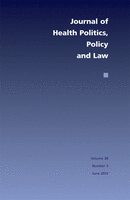We All Want It, but We Don't Know What It Is: Toward a Standard of Affordability for Health Insurance Premiums
Journal of Health Politics, Policy and Law, 2011. Volume 36 / Issue 05 / July 2011, pp 829-853, Published online
The 2010 Patient Protection and Affordable Care Act (P.L. 111-148), or ACA, requires that U.S. citizens either purchase health insurance or pay a fine. To offset the financial burden for lower-income households, it also provides subsidies to ensure that health insurance premiums are affordable. However, relatively little work has been done on how such affordability standards should be set. The existing literature on affordability is not grounded in social norms and has methodological and theoretical flaws. To address these issues, we developed a series of hypothetical vignettes in which individual and household sociodemographic characteristics were varied. We then convened a panel of eighteen experts with extensive experience in affordability standards to evaluate the extent to which each vignette character could afford to pay for one of two health insurance plans. The panel varied with respect to political ideology and discipline. We find that there was considerable disagreement about how affordability is defined. There was also disagreement about what might be included in an affordability standard, with substantive debate surrounding whether savings, debt, education, or single parenthood is relevant. There was also substantial variation in experts' assessed affordability scores. Nevertheless, median expert affordability assessments were not far from those of ACA.

Publication File
Wagner Faculty
URL